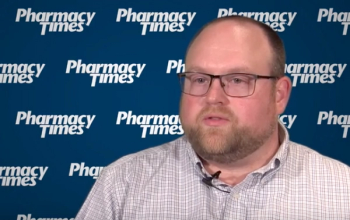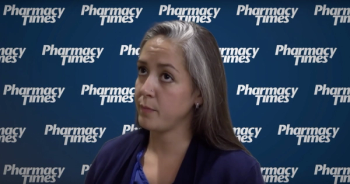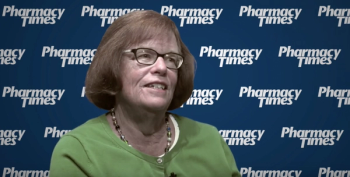
Daniel Griffis, PharmD, pharmacy manager at Rainbow Drug Store, Brunswick, GA, sat down with Pharmacy Times to discuss the diabetes management system at the pharmacy.

Daniel Griffis, PharmD, pharmacy manager at Rainbow Drug Store, Brunswick, GA, sat down with Pharmacy Times to discuss the diabetes management system at the pharmacy.

Julie Johnson, PharmD, Dean of the University of Florida College of Pharmacy, discusses how practicing pharmacists can implement and use precision medicine in their everyday work.

Suzy Soliman, PharmD, founder of the Pharmacist Moms Group, discusses the goals she has for the online community and what its members can accomplish.

Suzy Soliman, PharmD, explains the various ways in which pharmacist moms communicate within their community.

Stay tuned for upcoming coverage on the NACDS Total Store Expo in Boston, MA, August 24-26.

Suzanne Soliman, PharmD, founder of the Pharmacist Moms Group, talks about her hopes for the future of the online community.

Daniel Griffis, PharmD, pharmacist at the Rainbow Drug Store, sat down with Pharmacy Times and discussed the various services that the pharmacy provides.

Lindsay Davis, PharmD, BCPS, ASH-CHC, TTS and Elizabeth Pogge, PharmD, MPH, BCPS-AQ Cardiology, both professors at t Midwestern University College of Pharmacy – Glendale, Glendale, AZ, discuss pharmacists as patient care providers, and managing patients taking anticoagulation medications.

Suzy Soliman, PharmD, discusses why pharmacist moms needed a space for themselves.

McKesson's Central Fill as a Service program can expand revenue opportunities for pharmacists—Joe Tammaro explains how.

Katie Westgerdes, PharmD, pharmacist at the ONU Healthwise Pharmacy, discusses the Cardinal Health generic brand products, LEADER, and their place in the ONU Healthwise Pharmacy during the 2019 Cardinal Health Retail Business Conference.

The 2019 Paul R. Dawson Award for Excellence in Patient Care Research has been awarded to Dr. Karen Hudmon, Dr.PH, MS, BSPharm, professor of pharmacy practice at the Purdue University College of Pharmacy.

Larry Schieber, RPh, pharmacist and owner of Shieber Pharmacy in Circleville, OH discusses the challenges in prescription drug abuse prevention programs at the 2019 Cardinal Health Retail Business Conference in Nashville, TN.

Steve Lawrence, senior vice president of Independent Sales at Cardinal Health, spoke with Pharmacy Times about Generation Rx and the company’s efforts to prevent prescription drug misuse.

Julie Johnson, PharmD, Dean of the University of Florida College of Pharmacy, speaks about the various goals of precision medicine, and how pharmacists can implement precision medicine to improve patient health.

Kaelen C. Dunican, PharmD, Professor at Massachusetts College of Pharmacy & Health Sciences, MA, discusses different opportunities for collaboration between pharmacy students and other medical professionals, and how those collaborations can improve students' learning.

Larry Schieber, RPh, pharmacist and owner of Shieber Pharmacy in Circleville, OH discusses the importance of the Generation Rx materials in drug abuse prevention at the Cardinal Health Retail Business Conference in Nashville, TN on July 19, 2019.

Suzy Soliman, PharmD, founder of the Pharmacist Moms Group, discusses how the group originated and why it's needed.

A recent study found that Integrating smart pump infusions with electronic health records results in fewer errors when administering medication, but does not eliminate them entirely

Debbie Weitzman, president of pharmaceutical distribution at Cardinal Health, speaks to Pharmacy Times® about the services that Cardinal Health offers across the distribution model during the Cardinal Health Retail Business Conference in Nashville, TN.

Many health systems are still unaware of the role of a psychiatric pharmacist provider. Tera Moore, PharmD, discusses strategies for increasing awareness.

Larry Schieber, RPh, pharmacist and owner of Shieber Pharmacy in Circleville, OH discusses his community's drug abuse prevention coalition, the Pickaway Addiction Action Coalition, at the Cardinal Health Retail Business Conference in Nashville, TN on July 19, 2019.

A study conducted by pharmacy professionals at the Ferris State University College of Pharmacy found several important motivators for Doctor of Pharmacy candidates’ involvement in research and scholarship projects, and simultaneously identified several barriers limiting their participation.

Stephanie Conway, PharmD, RPh, Associate Professor at Massachusetts College of Pharmacy & Health Sciences—Worcester/Manchester, discusses best practices for encouraging collaboration between pharmacy and optometry students.

Larry Schieber, RPh, pharmacist and owner of Shieber Pharmacy in Circleville, OH discusses how a pharmacy background can help with drug abuse prevention efforts at the Cardinal Health Retail Business Conference in Nashville, TN on July 19, 2019.

Rapid diagnostic testing resulted in providers receiving a large increase in pharmacist recommendations in 2 community hospital settings.

Patricia Kienle, BSPHARM, MPA, FASHP, discusses how and why compounding pharmacies should work with interdisciplinary teams on issues of patient safety.

Katie Westgerdes, PharmD, pharmacist at the ONU Healthwise Pharmacy, discusses the medication therapy management at ONU Healthwise Pharmacy during the Cardinal Health Retail Business Conference on July 19, 2019.

Pharmacists have long known that they do much more than dispense medications, but the Pharmacists for Healthier Lives campaign is using social media, videos, and real-world stories to spread that knowledge to the consumers.

Lindsay Davis and Elizabeth Pogge, of the Midwestern University College of Pharmacy-Glendale, discuss key tips for how pharmacists can be impactful for their patients.